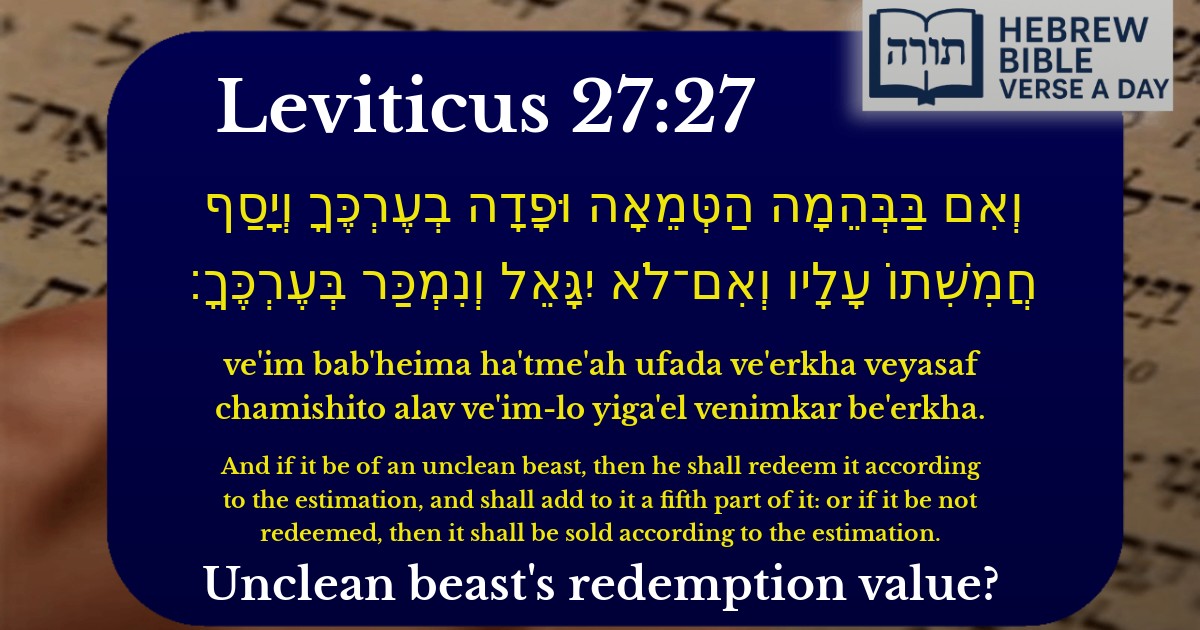Join Our Newsletter To Be Informed When New Videos Are Posted
Join the thousands of fellow Studends who rely on our videos to learn how to read the bible in Hebrew for free!
Hebrew Text
וְאִם בַּבְּהֵמָה הַטְּמֵאָה וּפָדָה בְעֶרְכֶּךָ וְיָסַף חֲמִשִׁתוֹ עָלָיו וְאִם־לֹא יִגָּאֵל וְנִמְכַּר בְּעֶרְכֶּךָ׃
English Translation
And if it be of an unclean beast, then he shall redeem it according to the estimation, and shall add to it a fifth part of it: or if it be not redeemed, then it shall be sold according to the estimation.
Transliteration
Ve'im bab'heima ha'tme'ah ufada ve'erkha veyasaf chamishito alav ve'im-lo yiga'el venimkar be'erkha.
Hebrew Leining Text
וְאִ֨ם בַּבְּהֵמָ֤ה הַטְּמֵאָה֙ וּפָדָ֣ה בְעֶרְכֶּ֔ךָ וְיָסַ֥ף חֲמִשִׁת֖וֹ עָלָ֑יו וְאִם־לֹ֥א יִגָּאֵ֖ל וְנִמְכַּ֥ר בְּעֶרְכֶּֽךָ׃
וְאִ֨ם בַּבְּהֵמָ֤ה הַטְּמֵאָה֙ וּפָדָ֣ה בְעֶרְכֶּ֔ךָ וְיָסַ֥ף חֲמִשִׁת֖וֹ עָלָ֑יו וְאִם־לֹ֥א יִגָּאֵ֖ל וְנִמְכַּ֥ר בְּעֶרְכֶּֽךָ׃
🎵 Listen to leining
Parasha Commentary
📚 Talmud Citations
This verse is quoted in the Talmud.
📖 Arakhin 6b
The verse is discussed in the context of the laws of redemption and valuation of unclean animals, particularly focusing on the additional fifth part required for redemption.
📖 Bekhorot 13b
The verse is referenced in a discussion about the differences between clean and unclean animals in matters of valuation and redemption.


Context in Vayikra (Leviticus)
The verse (Vayikra 27:27) appears in the context of the laws of erechin (vows of valuation), where a person pledges the value of an animal or property to the Beit HaMikdash. Here, the Torah specifies the procedure for redeeming an unclean animal (e.g., a donkey or camel) that has been consecrated.
Rashi's Explanation
Rashi (Vayikra 27:27) clarifies that this verse deals with an animal that is tamei (ritually unclean) and thus unfit for sacrifice. If the owner wishes to redeem it, they must pay its assessed value (erech) plus an additional fifth (20%). Rashi emphasizes that this added fifth serves as a penalty or deterrent against casually vowing and then retracting consecrated items.
Rambam's Legal Perspective
In Hilchot Arachin V'Charamin (6:1-2), the Rambam codifies this law, stating that the redemption of an unclean animal follows the same principles as other consecrated property. The additional fifth ensures the sanctity of vows is upheld, as negligence in fulfilling them diminishes the reverence due to mitzvot.
Talmudic Discussion (Arachin 6b-7a)
Midrashic Insight (Torat Kohanim)
The Torat Kohanim (Sifra) teaches that this law underscores the gravity of vows. Even though the animal is unclean, its consecration creates a binding obligation. The added fifth reflects the principle that one must go beyond the minimum when rectifying a sacred matter.
Practical Implications
If the owner does not redeem the animal, the Beit HaMikdash authorities sell it to others at its assessed value. The proceeds are then used for sacred purposes, ensuring the original vow’s intent is honored. This highlights the Torah’s balance between individual commitment and communal sanctity.